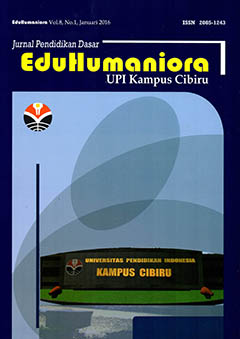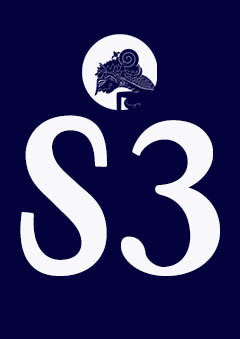PROJECT BASED PANCASILA ECONOMIC LEARNING FOR STUDENTS OF ELEMENTARY SCHOOL
Abstract
Pancasila economy is an economic system imposing a joint venture based on kinship and cooperation to symbolize Indonesian identity which is not possessed by another country. Besides, the Pancasila economy is the philosophical foundation and the 1945 constitution (UUD 45) is the constitutional foundation of Indonesia. This research aimed to describe how the implementation of Project-Based Pancasila Economic Learning through the Experiential Learning method. Project-based done, of course, adjusts to students who are still elementary school age. This research used an action research approach in Public Elementary School Blitar, Indonesia, the research subject was 70 elementary students. Data collection was conducted by interview, questionnaire, and Forum Grup Discussion (FGD). The research finding showed that the students were able to interpret that economic learning could be conducted outside the class. By experiential learning method, the students were expected to be more understand the purpose of Pancasila Economic learning. In addition, based on the learning mentioned, the students could understand and implement the form of Pancasila Economic, especially practicing the precepts in everyday life.
Keywords
Full Text:
PDFReferences
Abdulkarim, A., Komalasari, K., Saripudin, D., Ratmaningsih, N., and Anggraini, D. N. (2020). Development of a unity in diversity-based pancasila education text book for Indonesian universities. International Journal of Instruction, 13(1), 371–386.
Agussalim, Widjaja, S. U. M., Haryono, A., and Wahyono, H. (2021). Pancasila economic character literacy program for high school students. International Journal of Instruction, 14(1), 235–252.
Bada, S. O., and Olusegun, S. (2015). Constructivism learning theory: A paradigm for teaching and learning. Journal of Research and Method in Education, 5(6), 66-70.
Baker, M., and Robinson, S. (2016). The effects of kolb’s experiential learning model on successful intelligence in secondary agriculture students. Journal of Agricultural Education, 57(3), 129–144.
Chiang, C., and Lee, H. (2016). The effect of project-based learning on learning motivation and problem- solving ability of vocational high school students. International Journal of Information and Education Technology, 6(9), 709–712.
Cörvers, R., Wiek, A., de Kraker, J., Lang, D. J., and Martens, P. (2016). Problem-based and project-based learning for sustainable development. Sustainability Science: An Introduction, 349-358.
Dennick, R. (2016). Constructivism: Reflections on twentyfive years teaching the constructivist approach in medical education. International Journal of Medical Education, 7, 200–205.
Eny Kusdarini, Sunarso, I. A. (2020). The implementation of pancasila education through field work learning model. Cakrawala Pendidikan, 39(2), 398–410.
Gai Mali, Y. C. (2016). Project-based learning in Indonesian efl classrooms: From theory to practice. IJEE (Indonesian Journal of English Education), 3(1), 89–105.
Giac, C. C., Gai, T. T., and Hoi, P. T. T. (2017). Organizing the experiential learning activities in teaching science for general education in Vietnam. World Journal of Chemical Education, 5(5), 180–184.
Gülbahar, Y., and Tinmaz, H. (2014). Implementing project-based learning and e-portfolio assessment in an undergraduate course. Journal of Research on Technology in Education, 38(3), 309–327.
Kolb, A. Y., and Kolb, D. A. (2017). Experiential learning theory as a guide for experiential educators in higher education. Experiential Learning and Teaching in Higher Education, 1(1), 7-44.
Leal-Rodríguez, A. L., and Albort-Morant, G. (2018). Promoting innovative experiential learning practices to improve academic performance: Empirical evidence from a Spanish Business School. Journal of Innovation and Knowledge, 4(2), 97–103.
Lee, S. (2014). Increasing student learning: A comparison of students’ perceptions of learning in the classroom environment and their industry-based experiential learning assignments. Journal of Teaching in Travel and Tourism, 7(4), 37–54.
Mak, B., Lau, C., and Wong, A. (2017). Effects of experiential learning on students: An ecotourism service- learning course. Journal of Teaching in Travel and Tourism, 17(2), 85–100.
Mardiono, M., Miftahuddin, and Kuncorowati, P. W. (2017). The educational of the national character of pancasila in secondary school based on pesantren. Cakrawala Pendidikan: Jurnal Ilmiah Pendidikan, 3(36), 423-434.
MS, B., Rahmawati, S., and Wardani, S. (2017). The development of a learning media for visualizing the pancasila values based on information and communication technology. Cakrawala Pendidikan: Jurnal Ilmiah Pendidikan, 36(3), 502–521.
Pesurnay, A. J., (2018). Pancasila ideology as a field of interpretation. Digital Press Social Sciences and Humanities, 1, 161–170.
Rahmania, I. (2021). Project based learning (PjBL) learning model with STEM approach in natural science learning for the 21st century. Budapest International Research and Critics Institute (BIRCI-Journal): Humanities and Social Sciences, 4(1), 1161-1167.
Rochmat, S. (2018). Transformative education as a dialectic of Indonesian culture and modern culture. Cakrawala Pendidikan: Jurnal Ilmiah Pendidikan, 37(3), 366–377.
Sepdanius, E., Komaini, A., and Afriani, R. (2018). Standardization on the facilitator. Cakrawala Pendidikan: Jurnal Ilmiah Pendidikan, 294–305.
Siswoyo, D. (2013). The view of bung karno on pancasila and education. Jurnal Cakrawala Pendidikan, 5(1), 103–115.
Sumardi, L., Rispawati, R., and Ismail, M. (2018). The effect of information technology on learning (a study on civic and pancasila education students at mataram university). JPP (Jurnal Pendidikan dan Pembelajaran), 24(2), 73-78.
Sumardjoko, B., and Musyiam, M. (2018). Model of civic education learning based on the local wisdom for revitalizing values of pancasila (Bahasa Indonesia). Cakrawala Pendidikan, 37(2), 201–211.
Susandi, A. D., Sa, C., and Rahman, A. (2022). Developing the M6 learning model to improve mathematic critical thinking skills. Pedagogika / Pedagogy, 145(1), 182–204.
Yang, D., Skelcher, S., and Gao, F. (2021). An investigation of teacher experiences in learning the project- based learning approach. Journal of Education and Learning (EduLearn), 15(4), 490–504.
DOI: https://doi.org/10.17509/eh.v15i1.49909
Refbacks
- There are currently no refbacks.
Copyright (c) 2023 EduHumaniora | Jurnal Pendidikan Dasar Kampus Cibiru
EduHumaniora: Jurnal Pendidikan Dasar
Published in collaboration Program Studi PGSD UPI Kampus Cibiru
and
HDPGSDI
This work is licensed under a Creative Commons Attribution-ShareAlike 4.0 International License.















